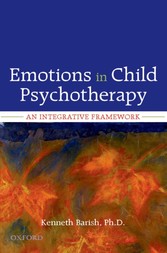Suchen und Finden
Emotions in Child Psychotherapy: An Integrative Framework
Emotions are the common ground of child psychotherapy and a therapists essential means of communication with children. Improved emotional resilience must be the shared therapeutic goal of all those who work with children and families. In Emotions in Child Psychotherapy, Kenneth Barish presents an integrative framework for child therapy, based on a contemporary understanding of the childs emotional experience. Barish begins with a concise review of recent advances in the psychology and neuroscience of emotions and an analysis of several emotions-interest, shame and pride, anxiety, anger, and sadness-that are essential, but often underappreciated, in therapeutic work with children. Offering an emotion-based perspective on optimal and pathological development in childhood, Barish argues that in pathological development, negative emotions have become malignant and children are locked in vicious cycles of interaction that perpetuate defiance and withdrawal. Based on these principles, Barish presents a comprehensive model for therapeutic work with children and families. He demonstrates how a systematic focus on the childs emotions provides new understandings of all phases of the therapeutic process and effective means of solving persistent clinical problems: how to engage more children in treatment, mitigate the childs resistance, and provide the kind of understanding to children that promotes openness, initiative, and pro-social character development. Finally, Barish offers a set of active therapeutic strategies that will help repair family relationships damaged by frequent anger and resentment, as well as specific techniques to help parents resolve many of the most common challenges of childrearing. Emotions in Child Psychotherapy includes extensive clinical illustrations and addresses many of the problems faced, at some time, by every child therapist. Both richly informative and highly practical, this book will be value to all students of child therapy and to practicing clinicians of differing theoretical orientations.
Alle Preise verstehen sich inklusive der gesetzlichen MwSt.












